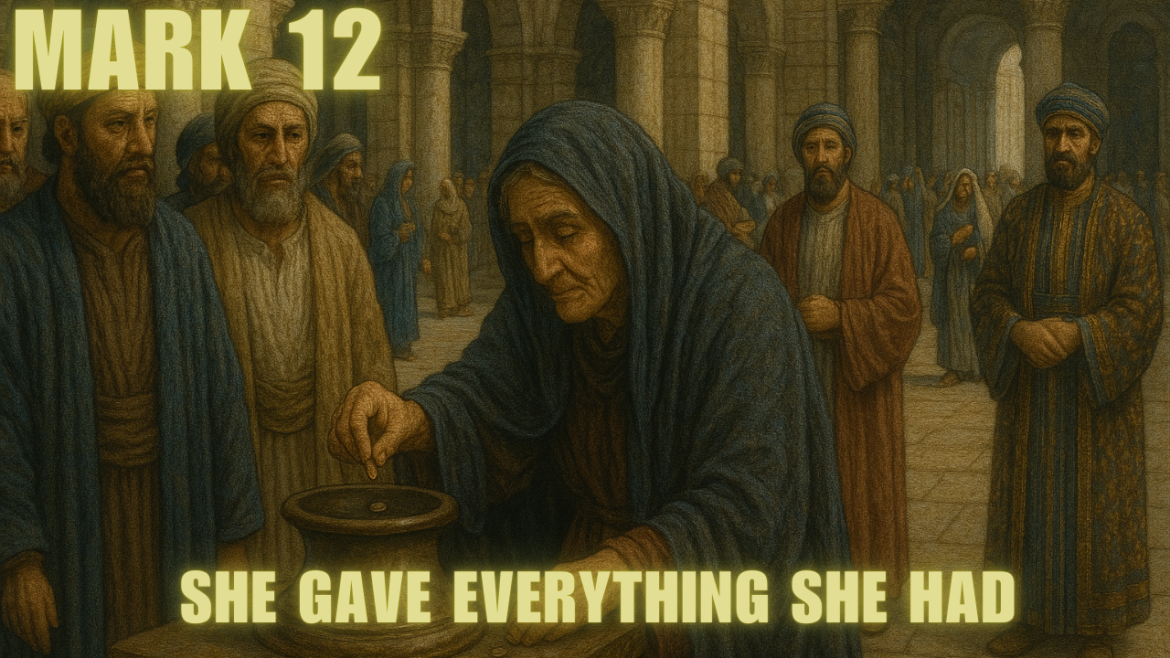Mark 12 is packed with parables, challenges, and wisdom that cuts through time, culture, and even religious institutions. From the tenants in the vineyard to a widow’s quiet act of giving, the teachings of Jesus in this chapter show us what it truly means to live a life of faith, integrity, and love. These stories aren’t just theological debates from centuries ago—they touch the very core of how we relate to God, power, possessions, and each other today.
The Parable of the Tenants: When the Servants Are Ignored
Jesus opens with a vivid parable about a vineyard owner, his mistreated servants, and his rejected son. This story mirrors God’s repeated attempts to reach His people through prophets, culminating in sending His Son—Jesus. The imagery of the vineyard echoes Isaiah 5:7, where God expects justice and righteousness but finds bloodshed and cries.
The message is clear: those entrusted with God’s work must produce fruit—acts of justice, mercy, and spiritual truth. The religious leaders in Jesus’ time weren’t doing that. And sometimes, if we’re honest, neither are we. This parable reminds us to check our spiritual output. Are we bearing fruit, or just holding onto our own comfort and control?
The Cornerstone Rejected: The New Foundation
Jesus follows up with a powerful quote: “The stone the builders rejected has become the cornerstone.” The religious leaders, trying to maintain their structure, fail to see that the very person they reject is essential to the new covenant. This foundational stone isn’t just theology—it represents how often we overlook what’s truly important. Today, how often do we reject wisdom or truth because it challenges our status quo?
Render to Caesar—and to God
Then comes the famous question about taxes. The Pharisees and Herodians attempt to trap Jesus: Should they pay taxes to Caesar or not? His reply is both wise and profound: give Caesar what is Caesar’s and God what is God’s.
Here’s the key point—our allegiance doesn’t end with civic duty. We are stamped with God’s image, like coins bear Caesar’s. That means our lives, not just our wallets, belong to Him. In an age where political divides run deep, this lesson asks: Are we more loyal to governments and systems than to God’s kingdom?
The Sadducees and the Resurrection: Honest vs. Dishonest Questions
Next up are the Sadducees, who concoct a bizarre hypothetical about a woman with seven husbands. Their question isn’t sincere—it’s a trap, and Jesus knows it. His response is sharp: “You don’t know the Scriptures or the power of God.”
He corrects their view not just about marriage in heaven, but about the very nature of resurrection and eternity. It’s a reminder to us: God is not the God of the dead but of the living. If your questions about faith come from a genuine place, keep asking. But if you’re setting traps or clinging to shallow arguments, maybe it’s time to get honest.
What Matters Most? Love.
When asked about the greatest commandment, Jesus doesn’t hesitate: Love God fully. Love your neighbor as yourself. That’s it.
This wasn’t just theological brilliance—it was deeply personal. Jesus unifies the heart of the Torah with practical living. In modern times, where love is often distorted or conditional, this command cuts through: Love is the foundation of faith. Without love, rules and rituals mean nothing.
The Widow’s Offering: Faith in Action
The chapter ends with a quiet, breathtaking moment. A poor widow drops two small coins into the offering. That’s all she has. While the wealthy give out of abundance, she gives everything. And Jesus notices.
This story flips our idea of generosity. True giving isn’t measured by amount, but by sacrifice and faith. In a world obsessed with wealth and self-preservation, her act reminds us: Faith often looks like letting go.
Bringing It Home: What This Means for Us
So, what does Mark 12 teach us today?
- Be honest with God. Ask real questions. Don’t play games with faith.
- Bear fruit. Live a life that reflects justice, love, and truth.
- Give from the heart. Whether it’s time, money, or love—give with faith, not fear.
- Love first. Let your love for God and people shape every decision.
We often get caught up in religious details or theological debates, but Mark 12 brings us back to the essentials: faith, humility, and love.
Conclusion: Living Cornerstone Lives
Mark 12 challenges us to build our lives on the cornerstone—Jesus—and not reject the very foundation meant to hold us up. Whether you’re a long-time believer or just exploring faith, these teachings call us to a life that is generous, honest, and rooted in love. Let’s not be like the leaders who plotted and postured. Let’s be like the widow—quietly faithful, deeply trusting, and completely surrendered.

